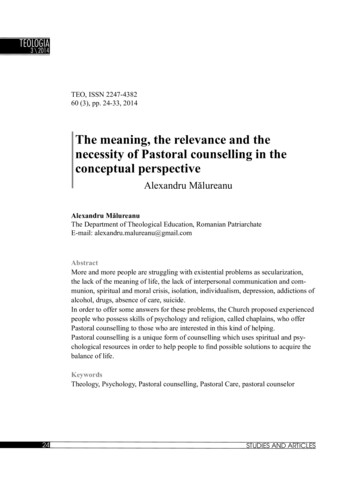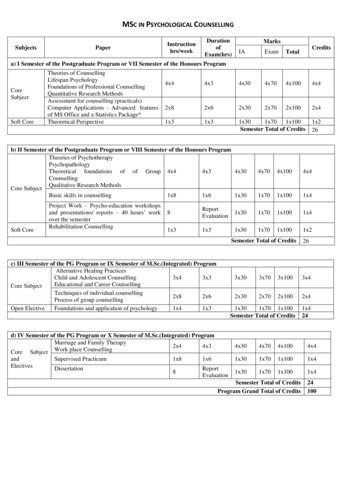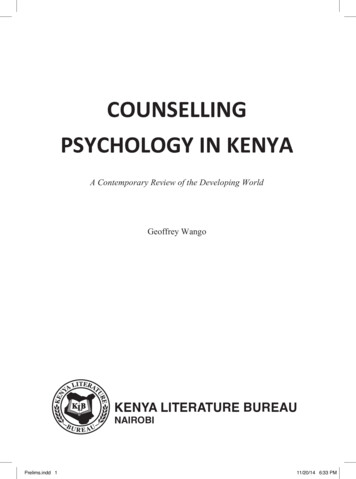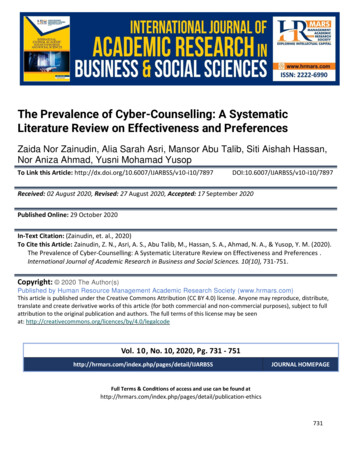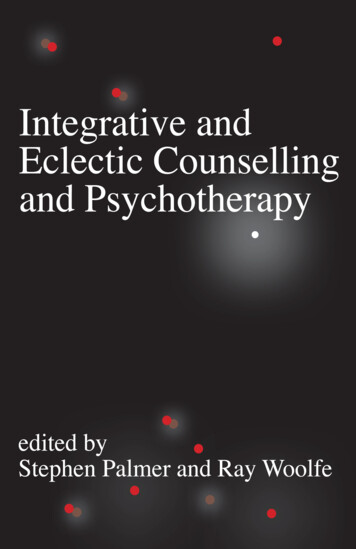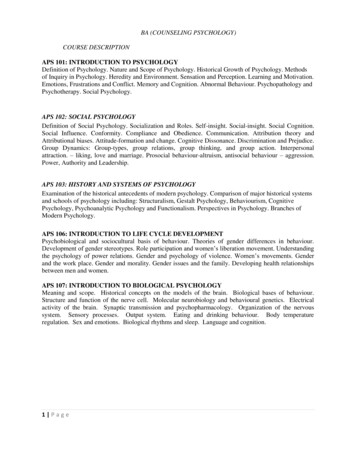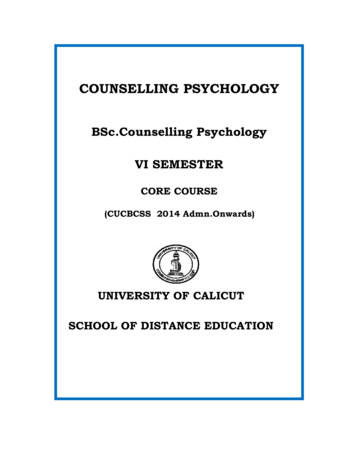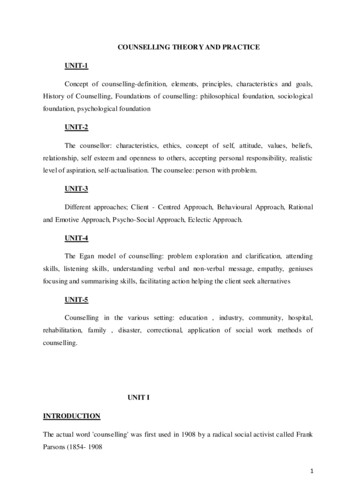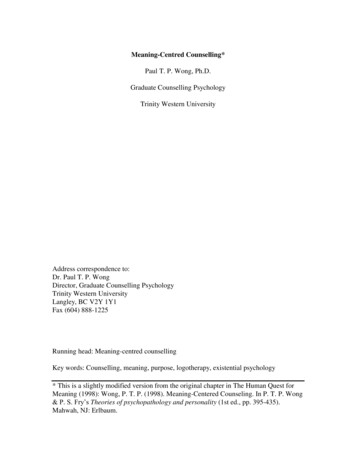
Transcription
Meaning-Centred Counselling*Paul T. P. Wong, Ph.D.Graduate Counselling PsychologyTrinity Western UniversityAddress correspondence to:Dr. Paul T. P. WongDirector, Graduate Counselling PsychologyTrinity Western UniversityLangley, BC V2Y 1Y1Fax (604) 888-1225Running head: Meaning-centred counsellingKey words: Counselling, meaning, purpose, logotherapy, existential psychology* This is a slightly modified version from the original chapter in The Human Quest forMeaning (1998): Wong, P. T. P. (1998). Meaning-Centered Counseling. In P. T. P. Wong& P. S. Fry’s Theories of psychopathology and personality (1st ed., pp. 395-435).Mahwah, NJ: Erlbaum.
Meaning-Centred Counselling2AbstractAfter reviewing the role of personal meaning in the literature, the paper presents apsychological model of meaning-centred counselling. As an extension of logotherapy, themodel is a hybrid resulting from the marriage between existential therapy and cognitivepsychology. Some of the concepts in logotherapy are translated into cognitive processes.Meaning is defined in terms of cognitive, affective and motivational components; thistriangular hypothesis of the meaning structure can be used to test the authenticity ofspecific meanings in life and study developmental changes in personal meanings. Themain propositions of the model are as follows: (1) Personal meaning is the keycontributing factor of self-validation, which consists of self-acceptance, self-affirmationand self-integration. (2) Personal meaning is a major moderator of stress resistance andwell-being. (3) The will to meaning is a primary motive consisting of a) the motivation toseek understanding and coherence through the cognitive process of existential attributionand b) the motivation to discover and pursue meaningful life tasks through cognitive andbehavioural processes. (4) There are five parallel motivaitonal principles: survival,pleasure, meaning, reinforcement and social validation; mental health depends onmeeting the motivational needs in all five areas. (5) Self-transcendence is a majorcontributor to personal meaning and well-being. Findings from the implicit theoriesresearch and the Personal Meaning Profile are presented to support the above hypotheses.Various cognitive therapeutic techniques are introduced to promote personalmeaning. Existential probing is used to discover the meaning and purpose of events andactions. Contextualizing is employed to place the problem in a larger context. These twoassessment tools are aimed at discovering the deeper meaning of presenting problems andthe client’s ultimate concerns. Magical thinking is used to explore new possibilities forlife change. Personal Meaning Profile and effective coping strategies are used to equipand empower the client to cope with life’s demands and pursue meaningful life goals.According to this model, the counsellor works closely with the client, not as a passivelistener, but as a coach who provides the expertise and social validation needed forsuccess in the client’s quest for a meaningful existence.The implications of the model for career counselling, cross-cultural counselling,developmental counselling and pastoral/spiritual counselling are also discussed. Isconcluded that meaning-centred counselling is uniquely suited to meeting the widespreadneed for meaning and purpose in a society of disintegrating values and unprecedentedchange. The model’s positive message of hope and human dignitymodel is particularlyrelevant to three major challenges to counselling psychology in the next century, namely,aging, AIDS and euthanasia.
Meaning-Centred Counselling3Meaning-Centred Counselling“Who am I? Why am I here? What is the purpose of my life? What should I dowith my present life? What will happen to me next? How can I find love, happiness andsuccess?” Are you seeking answers to these most important questions in your life? Callyour psychic counsellor.One can see this sort of advertisement on the television and newspapers on a dailybasis. Is this a sign of the times, an indicator of the crying need for meaning?In the context of intense global competition and diminishing job opportunities,life has become increasingly difficult for large segments of our society. Here is a thumbnail sketch of some common observations:Young people are the hardest hit by unemployment. Many high school andcollege graduates have no jobs, no goals, no commitments, nothing to look forward toand nothing to live for; they need a reason to get out of bed and look for something to getthrough the day.The ranks of the working poor are being swelled by the under-employed, theunder-paid and jugglers of part-time jobs. So many are stretched to the limit just tosurvive. Often, couples have to leave home before dawn and endure numerous hasslesthroughout the day -- traffic jams, mean bosses, nasty colleagues, and dirty office politics,etc. They have no time for children, no time for each other, and no time for what theyreally want to do. They work longer and harder, but still do not have enough money topay the bills.Then, there are the disadvantaged, the disenfranchised, the slackers, the drifters,and the homeless. There is a growing number of people who live a life of quietdesperation and alienation -- they have given up on society and on the future. For them,the American dream has become an endless nightmare.If life is so hard, why survive? If life is full of pain and frustration, what is thepoint of going on? If there is no escape from the numbing repetition of boring routines, towhat end do we strive? If one has so little control over what happens to one’s life, howcan one find meaning and purpose?“Why is this happening? Why me? Why now?” A chorus of Why questionsresonates in counselling rooms across the land as well as in the homes of ordinary peoplein their daily battles for survival.Frankl (1973a, 1985) characterizes modern society as suffering from a widespreadsense of meaninglessness. The loss of traditions and traditional values has made theindividual’s quest for meaning far more difficult than it was in the past. In the postmodern society of disintegration and diminished expectations, nihilism and despair have
Meaning-Centred Counselling4replaced purpose and hope. In the dying moments of the 20th century, many have turnedto psychic counsellors, astrologers and New Age gurus for answers. What kind ofanswers does psychology have to offer to a troubled world?The quest for meaning is more than a stale, tiresome philosophical cliché; it is oneof the greatest challenges facing individuals as well as the nation.In a moment of awakening to the reality of death and aloneness, Fowler (1981)asks: “When all these persons and relations and projects that shape and fill my life areremoved, who and what is left?” (p. xi). At certain points in life, we may all havequestioned what sustains our being and what makes life worth living.Such questions will not simply go away, no matter how hard we try to ignorethem, because the existential quest is rooted in basic human needs -- the need for orderand coherence in the midst of chaos; the need for personal significance and self worth inthe face of entropy and death; the need for positive meanings in spite of the negative lifeevents that often overwhelm us. In times of discontent, the search for meaning takes onadded stringency.Yet, mainstream psychology has been equivocal and hesitant in responding to thecrisis of meaning. Bruner (1990) points out that cognitive psychology has failed to carryits original intent to “establish meaning as the central concept of psychology” (p. 2), inspite of the fact that “psychology and the social sciences generally have always beensensitive, often oversensitive, to the needs of the society that give them shelter” (p. 6).Psychologists remain divided regarding the role of personal meaning.Some conclude that life has no ultimate meaning. How can there be any meaningin a society of random shooting, cutthroat competition and moral anarchy? How can therebe meaning when many children live fast and die young? How can we talk aboutmeaning, when we no longer have a shared language to communicate truth, love and allthe values that are supposed to make life worth living? The only possible answer toabsurdity and void is to exercise our freedom and act as if life had meaning.Another common viewpoint is that questions about meaning and purpose are toosubjective and philosophical to be answered scientifically. Trying to study meaning is likestepping into the muddy water of ideology. It is not possible to establish any objectivetruths about personal meanings of life. Questions of meaning are best left to thephilosophers and the clergy. People can be reasonably happy about life without having tosettle existential issues. One should simply plunge into the stream of living and take eachday as it comes.But there is an affirmative view -- meaning can be found in all circumstances andmeaning matters! Over the past four decades, Victor Frankl has been the most eloquentand influential proponent of this view. During his internment in Nazi concentrationcamps, Frankl discovered that a positive meaning-orientation is the key to survival: “This
Meaning-Centred Counselling5was the lesson I had to learn in three years spent in Auschwitz and Dacha: those most aptto survive the camp were those oriented towards the future, towards a meaning to befulfilled by them in the future” ( Frankl, 1986, p.37).The present paper reviews the role of meaning in the counselling literature,presents a psychological analysis of the concepts and processes of personal meaning, anddescribes a comprehensive meaning-centred model of counselling.Review of the literatureThe basic tenets of logotherapyFrom his own experiences and observations, Frankl (1959) developed the threebasic tenets of logotherapy: the freedom of will, the will to meaning, and the meaning oflife. The freedom of will liberates individuals from determinism. Individuals may not befree from certain conditions, but they are always free to choose their attitudes towards thecircumstances they are in; by exercising individual freedom and taking a stand towardssuffering they can rise above whatever predicament they are in (Frankl, 1967).The will to meaning is considered a primary and basic human motive. The maingoal in life is not to gain pleasure or power, but to find meaning and value in life. One iswilling to endure pain and hardship to the extent that suffering has a meaning (Frankl,(1959). Frankl considers Freud’s pleasure principle and Adler’s will to power asderivatives of the will to meaning.Pleasure is a byproduct or side effect of the fulfillment of our strivings, but isdestroyed and spoiled to the extent to which it is made a goal or target . . . . Thewill to pleasure mistakes the effect for the end, the will to power mistakes themean to an end for the end itself (Frankl, 1967, p.6).The meaning of life can be found even in the most appalling circumstances, andup to the very last moment of life, but individuals have to discover it for themselves. It isthe “will to meaning” and the “freedom to will” which enable humans to transcendexternal constraints to find meaning in existence.The meaning of life is unique for each person. Everyone is responsible to findmeaning in different situations and to discover one’s own mission in life. When one isstripped of everything that makes life worth living, or when one is in the throes ofbattling with pain and despair, it is still possible to find meaning: “It is precisely whenfacing such fate, when being confronted with a hopeless situation, that man is given a lastopportunity to fulfill a meaning -- to realize even the highest value, to fulfill even thedeepest meaning -- the meaning of suffering” (Frankl, 1967, p.15). His life epitomizesNietzsche’s dictum: “He who has a why to live for can bear almost any how”.Logotherapy does not prescribe meaning, but describes what life would be likewithout meaning and what could be done to find meaning. The therapist helps the client
Meaning-Centred Counselling6gain a new perspective on life and explore new opportunities of finding meaning. Frankl(1959, p. 133) concludes that there are three avenues or three types of values whereby onecan discover meaning: creative, experiential and attitudinal.Creative values are based on what the person gives to the world, such asachievements and good deeds. Experiential values refer to what the person receives fromthe world through experiencing something or encountering some one. Meaning can befound in an intense experience apart from any action. A single moment of intenseexperience can provide meaning for a life time (Frankl, 1973b).Attitudinal values are realized by adopting the right attitude and taking a standtowards unavoidable suffering or an unchangeable situation. The attitude of acceptance isessential in overcoming the tragic triad of guilt, suffering and death (Frankl, 1967, p.24).Acceptance leads to self-transcendence. Frankl argues that it is not suffering per se butfailing to see meaning in suffering that causes people to despair. By maintaining anoptimistic, accepting attitude, one can turn suffering into something meaningful.Frankl (1959) believes that there is potential meaning for every human being; onedoes not need to be a fully functioning member of society in order to lead a meaningfullife. The quality of life can be best maintained by fulfilling meanings. Once a potentialmeaning has been realized, it becomes part of the past; the certainty of past meaningsprovides an antidote to the uncertainty of the future. Optimism springs from a meaningorientation. For Frankl (1973b), there is no such thing as hopelessness. No matter howbleak the outlook, there is always the possibility that the future will bring some meaningfor the person.When the will to meaning is repeatedly frustrated, it can result in existential or“noogenic” neurosis. This frustration itself need not be pathological. The search formeaning may involve distress and tension, but this kind of tension is beneficial, becausethe dynamic of striving towards a valuable goal reorients individuals towards meaning.Frankl (1967) claims that mental health depends not on a tensionless state of homeostasis,but on “the striving and struggling for something worth longing and groping for” (p.68).Evaluation of logotherapyRecently, Fabry (1995) raised a very poignant question: “As our century ends, theworld is in chaos. Religious conflicts, national struggles, trade wars, cutthroatcompetition, ecological disasters, crime waves, family breakups -- what can put sapiensback into homo?” (p.7).More than ever, Frankl’s message offers hope to a wide variety of individualsstruggling to find meaning for their existence. His view that meaning is essential to bothmental and community health is gaining currency (Fabry, 1968; Frankl, 1992; May &Yalom, 1989; Wong, 1989a, 1991; Yalom, 1980). For example, Maddi (1970) reportsthat failure to find meaning leads to existential sickness. He emphasizes that individuals
Meaning-Centred Counselling7must create their own meanings through symbols, imagination and judgment. Wong(1989a) documents the important role of personal meaning in successful aging. Manysocial ills, such as drug addiction, alcoholism, and suicide may be viewed as individuals’attempts to escape from meaninglessness (Jacobson, Ritter & Mueller, 1977; Padelford,1974). Some evidence already exists, suggesting that promotion of personal meaning maybe effective in addressing these social problems (e.g., Carroll, 1993; Ellis & Smith,1991).Logotherapy is not a formal theory or a closed system; it is a therapeutic approachthat focuses on the central role of meaning in adaptation and survival. Frankl (1969)points out that the term logotherapy is used in a broad sense, and its relevance extendsbeyond the clinician’s office. He has made it clear that logotherapy can help the generalpublic. The strongest appeal of logotherapy is that the existential quest is a universalhuman experience and most people can benefit from meaning-centred counselling. Eventhough individuals have the freedom and the will to find meaning, they do not alwayssucceed. A variety of external and internal obstacles may frustrate one’s existentialsearch. The problem is further compounded by misguided life goals (Adler, 1931). Forexample, some believe that meaning only comes from getting to the top of the ladder.Others believe that life has meaning only when one is wealthy. Unfortunately, attainmentof these goals often leads to feelings of emptiness and disillusion. Logotherapy isintended to help individuals discover the true missions of their lives.The main weakness of logotherapy is that its principles are stated in philosophicalterms or in metaphor. This vagueness precludes scientific analysis. Although many ofFrankl’s views seem intuitive and are widely endorsed by therapists, Frankl has beencriticized for making claims unsubstantiated by research (Patterson, 1986; Yalom, 1980).For example, there is no priori reason or empirical evidence to support Frankl’s (1965,1969) claim that meaning in life occurs on the noological dimension which is separatefrom the psychological dimension.Another common critique of logotherapy is that it over-emphasizes values andspirituality. Therapeutic sessions often consist of teaching the values and philosophy oflogotherapy. Weisskopf-Joelson (1975) concludes that logotherapy is not scientific innature but represents a system of values or secular religion. Yalom (1980) also points outthat Frankl’s position is basically religious, because people must accept on faith that thereis meaning in life.It is now widely accepted that values and meanings are important considerationsin counselling (Patterson, 1986). There is also increasing recognition of the relevance ofreligious values in psychotherapy and mental health (Bergin, 1980, 1991; Jones, 1994).Nevertheless, an emphasis on spirituality and values does not negate the need forscientific analysis and systematic research.In spite of his rise to prominence in psychology (Sahakian, 1985) and his everincreasing influence on the general public, Frankl’s impact on research and academic
Meaning-Centred Counselling8psychology has been limited by the philosophical and religious approach favored byFrankl and his followers. His writings are faithfully proclaimed and expounded by hisdisciples as if they were the sacred scriptures. Within the logotherapy movement, there islittle evidence of critical self examination and creative tension. What is needed are freshideas, rigorous debate and systematic research, without which new developments inlogotherapy are unlikely.The role of meaning in humanistic/existential psychologySeveral themes of humanistic/existential psychology directly bear on personalmeaning (May & Yalom, 1989). For example, the theme of personal growth recognizesthat life is more than survival and pleasure seeking; it acknowledges a basic motivationpropelling and drawing humans towards the higher goal of self-actualization.Allport (1955) differentiates between deficiency and growth motives. Growthmotives include long-range purposes and striving towards distance and goals. “Thepossession of long-range goals, regarded as central to one’s personal existence,distinguishes the human being from the animal, the adult from the child, and in manycases, the healthy personality from the sick” (p. 51).Similarly, Maslow (1970, 1971) differentiates between basic needs andmetaneeds, which correspond to Allport’s deficiency and growth motivations. Accordingto Maslow (1968), the ultimate goal is self-actualization, which, in simple terms, meansto fulfill all of one’s potential. The higher one moves up on the hierarchy of needs, themore meaningful one’s life becomes. Self-actualization is considered to be a basic humantendency. Many people fail to self-actualize because of external constraints, fear of risktaking or being blind to their own potential. One of the qualities of a self-actualizedperson is self-acceptance -- accepting one’s self with all one’s limitations and acceptingthe world in which one lives. There is meaning inherent in the act of self acceptance.The theme of self-actualization is also prominent in Carl Rogers’ writings: “Theorganism has one basic tendency and striving -- to actualize, maintain, and enhance theexperiencing organism” (Rogers ,1951, p. 487). “Man’s behavior is exquisitely rational,moving with subtle and ordered complexity toward the goals his organism is endeavoringto achieve.” ( Rogers, 1961, p. 194-195). The purpose of life is to discover and actualizethe true self -- to become what we are meant to be by design or choice. Rogers (1980)believes that “our organisms as a whole have a wisdom and purposiveness which go wellbeyond our conscious thought” (p. 106).Rollo May is more explicit in his writings on meaning and purpose. He affirmsthat life has meaning:The creative person can affirm life in its three dimensions -- affirmhimself, affirm his fellow-men and affirm his destiny. To him life hasmeaning. He is warmed by the friendship of his fellows and cheered by theconfidence that he is of worth to them. Love can be supreme pleasure to
Meaning-Centred Counselling9him precisely because it is more than pleasure. His work can be satisfyingprecisely because it is part of a creative purpose larger than any particularwork. All of which means that life’s fundamental question receives apositive answer: the person has confidence in meaning in his destiny”(May, 1940, p. 19).Personal meaning not only comes from the continuous process of fulfilling one’spotentials, it also comes from religious beliefs, because “the essence of religion is thebelief that something matters -- the presupposition that life has meaning” ( May, 1940,pp. 19-20). “Denying the worth of other people, one cannot love with joy; denyingpurposiveness in the world, one cannot work with gratification; and denying meaning inthe total scheme of things, one cannot face one’s own destiny with courage” (p. 31).May (1953, 1967, 1969) also emphasizes making choices and being authentic asways of experiencing meaning. Life is a succession of choices in various life situations.You live your life most meaningfully if you recognize and accept the fact that one cannotavoid decisions. Personal meaning is derived from the conscious process of decisionmaking and from commitment to those decisions. Making choices involves takingchances: you can decide to be your authentic self or conform to tradition and convention.Authenticity involves self-acceptance and the courage to maintain individuality.These views may be criticized for placing too much emphasis on the individualand not enough emphasis on self-transcendence and the community. In contrast to theseproponents of self-actualization, Frankl advocates that the highest meaning does notcome from self-fulfillment, but rather from the actualization of a life-task or life-goalwhich transcends self-interest. Fabry (1995) summarizes Frankl’s view:Self-actualization, a popular goal in affluent societies, is fulfilling only when itis oriented toward meaning, not pleasure, power, and riches. Logotherapymaintains that meaning comes from self-transcendence (to reach out beyondoneself and do things for the sake of others), not from self-actualization (p. 9).Similarly, Bettelheim (1976) believes that the most difficult achievement and the greatestsatisfaction is to find meaning in our lives; in order to find meaning, one must transcendthe narrow confines of self-centred existence and make a significant contribution tosociety.The role of meaning in psychological researchResearch on personal meaning has been spotty and scanty. Most of the priorstudies on the linkage between personal meaning and psychological well-being has beendocumented (Crumbaugh & Maholick, 1969; Reker, Peacock, & Wong, 1987; Reker &Wong, 1988; Wong, 1989a, 1991, 1993).However, demonstration of a positive relationship between personal meaning andvarious outcome measures is just a first step. More vigorous and systematic research is
Meaning-Centred Counselling10needed to elucidate the construct of meaning and its role in adaptation. Consistent withFrankl’s position, it may be hypothesized that meaning is not only a necessary conditionfor mental health and personal growth, it is an important moderator in effective copingand stress resistance. This moderator hypothesis is likely to catapult personal meaningfrom the armchair of philosophical discourse to the centre stage of psychologicalresearch. There is already some empirical evidence that meaning is a better predictor ofwell-being than locus of control and optimism (Wong, 1993a).In recent years, issues related to meaning and purpose are receiving increasingattention from researchers (Baumeister, 1991; Ebersole & de Vogler, 1985; Emmons,1986; Faran & Keane-Hagerty, 1991; Korotkov, 1993; Little, 1983; Ryff, 1989; Ryff &Essex, 1992; Setterland & Niedenthal, 1993). These new directions of meaning-relatedresearch are reviewed in Wong (forthcoming).Meaning-centred CounsellingWhenever I mention meaning-centred counselling at meetings or in graduatecounselling classes, the most common reaction is: “Is this the same as Logotherapy andexistential psychotherapy?”My answer is “Yes” in terms of its emphasis on existential issues and the centralrole of personal meaning, but with respect to conceptual analysis and therapeutictechniques, meaning-centred counselling has more in common with cognitive therapy.Whenever possible, the philosophical insights of existential psychology are translated intocognitive/behavioral processes and key concepts are operationalized. Furthermore, itintroduces existential interventions, based on cognitive/behavioral principles. In sum,meaning-centred counselling is a hybrid from an unlikely marriage between existentialpsychotherapy and cognitive/behavior psychology.Meaning-centred counselling adopts the basic tenets of logotherapy and it may beconsidered an extension of logotherapy. However, there are differences in details and inemphases. For example, Frankl (1969) defines the will to meaning as the “basic strivingof man to find and fulfill meaning and purpose” (p.35). From the perspective of meaningcentred counselling, the will to meaning consists of two psychological processes: themotivation to seek the core meaning of a given life situation, and the motivation to seekpurpose and significance for one’s life goals.The main difference between logotherapy and meaning-centred counselling is thatthe former takes a philosophical and spiritual approach, while the latter favors a cognitiveor psychological approach. For example, Frankl (1959, 1967) considers meanings andvalues as belonging to the noological dimension, separate from the psychologicaldimension. But Patterson (1986) argues that “it should not be necessary to considermeanings and values as constituting an independent aspect of the individual; they shouldbe included as part of his or her psychological aspect” (p. 453). The present position isthat all existential issues, including meanings and values, can be subjected to
Meaning-Centred Counselling11psychological analysis. For example, existential attribution is concerned with questions ofmeaning, purpose and value, but it, like causal attribution, is a cognitive process (Wong,1991). Similarly, the assignment of personal worth and significance to life tasks may beconceptualized as an attributional process or incentive motivation (Klinger, 1977).In its present stage of development, meaning-centred counselling is neither aformal theory; nor a system of therapy. It is a comprehensive conceptual model whichemphasizes the central role of personal meaning in the process of adaptation and personalgrowth. It is an umbrella that covers various intervention models that emphasize thecentral role of personal meaning. Ishiyama’s (1989) self-validation model is an example,because affirmation of meaning is instrumental to self-validation. In a more recent paper,self-validation is defined as “a subjective experience of physical, social, personal andspiritual well-being by means of affirmation of one’s sense of self, purpose in life, andmeaningful personal existence in a given sociocultural context” (Ishiyama & Kitayama,1994, p.168).Meaning-centred counselling assumes that desirable changes and personal growthprimarily depend on: a) understanding and accepting the true meaning of one’s lifesituation, b) self and social validation of personal existence as being meaningful andworthwhile, and c) the pursuit and actualization of valuable life goals. Meaning-centredcounselling recognizes the importance of affirming different aspects of self, such asphysical appearance, intelligence and abilities, but it considers affirmation of personalmeaning as the heart and soul of self-validation. During intervention, the main focus is ondiscovering and realizing meaningful life goals.Another distinctive of meaning-centred counselling is that it explores the deepstructure of personal meanings. In contrast to Freud’s depth psychology, the deepstructure of meaning is not hidden in unconsciousness. Even though one may not be fullyaware of the deep meaning structure, and may have difficulty verbalizing it, one canaccess it through reflection, critical examination and life review.Taking the phenomenological approach, Rogers (1951, 1961) believes that what isreal to the person is that which exists within the person’s internal frame of reference. Theperson’s reality consists of his/her subjective perceptions and experiences; this innerreality forms the basis of behaviors and actions. Meaning-centred counselling goes deeperthan the stream of consciousness; it delves into the subterranean currents of existentialanguish, deep-seated beliefs and the core proces
Graduate Counselling Psychology Trinity Western University Address correspondence to: Dr. Paul T. P. Wong Director, Graduate Counselling Psychology Trinity Western University Langley, BC V2Y 1Y1 Fax (604) 888-1225 Running head: Meaning-centred counselling Key words: Counselling, meaning, purpose, logotherapy, existential psychology
